Essential Conversations: The Untold Stories of Motown
Ann Delisi September 15, 2020The Motown story told by author Adam White and Motown President, Barney Ales, who played a key role in the success of the legendary record label

When Berry Gordy launched Motown Records, he had an innate ability to recognize talent, hear a hit song and create Hitsville, a hit-making machine that churned out songs that would resonate with people of every age and race for decades.
Creating hit records was one part of the equation; the business was the other. And that was the critical role Gordy’s partner and friend, Barney Ales, played at Motown.
Ales died earlier this year from natural causes. They both managed their respective worlds and that partnership is what fueled this musical juggernaut into legendary status.
Essential Conversations’ Ann Delisi spoke with author, Adam White, who worked closely with Ales, to write the book “Motown The Sound of Young America”. What makes this book unique among the various books dedicated to the telling the Motown story is that it was co-written by Ales, who worked in such a critical role side-by-side with Gordy.
In addition, this book contains never-before-seen photographs of Motown Records recording artists from Ales’ private collection. White also spoke to Ales about the few times he contributed to the creative side of the label.
“Barney wasn’t musical, but could come up with a lyric idea or theme,” White said. “One of those was “Once Upon A Time” by Marvin and Mary Wells, credited to Mickey [Stevenson] and Barney.”
Through his access to Ales and Motown insiders, Adam White explores Motown’s cultural and historical impact in a different way than we are used to.
In this episode:
- The myth that Motown Records didn’t put their Black artists on the covers of their albums
- How U.K. recording artists, Dusty Springfield and The Beatles, embraced the artists and music on Motown creating a whole new audience for the Detroit record label and its artists
- The profoundly talented and complicated Motown artist, Marvin Gaye
- How Stevie Wonder almost left Motown and the efforts to keep him on the label including an unprecedented royalty rate and creative freedom
- The pivotal roles Dick Clark and Ed Sullivan played in promoting Motown artists and their intolerance of racism
Trusted, accurate, up-to-date
WDET is here to keep you informed on essential information, news and resources related to COVID-19.
This is a stressful, insecure time for many. So it’s more important than ever for you, our listeners and readers, who are able to donate to keep supporting WDET’s mission. Please make a gift today.
